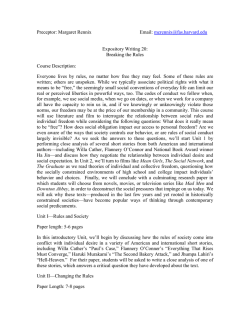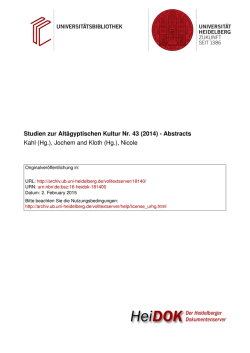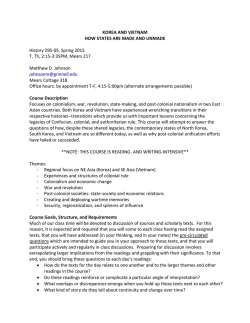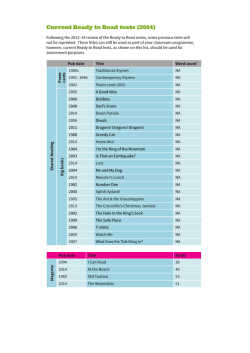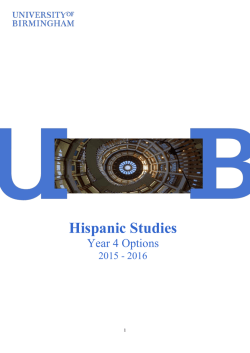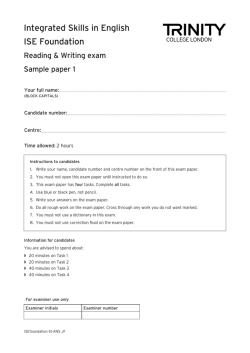
Qualification reform update
Qualification reform update GCSE reform and redevelopment 2 GCSE English: structural changes 3 • First teaching September 2015 • Untiered • New 1 to 9 grading scale • 100% external, terminal assessment • November re-take opportunity, but only for 16+ • No single English option • Speaking and Listening as separate endorsement GCSE English Language: criteria Reading (50%): • Students should read ‘high quality, challenging texts from the 19th, 20th and 21st centuries’ • The text types must include literature, literary non-fiction and other non-fiction writing such as essays, reviews and journalism (both printed and online) • All examination texts will be unseen, and be drawn from each of the three centuries • Assessing: comprehension, critical reading, summary and synthesis, writers’ choices (including grammatical) ones and comparison 4 GCSE English Language: criteria Writing (50%): • clear and coherent text, for different audiences and purposes • for impact • including ‘creatively and imaginatively’ • 20% of whole qualification allocated to SPaG Speaking and Listening (unweighted): • renamed Spoken Language • focuses on presentation skills, effective listening and use of standard English 5 What choices do boards have? 6 • Matching text types and periods • Number of texts; length of texts • Types of texts (within the broader categories); themes • Paper structure: relationship between reading and writing • Writing tasks • Number and length of papers GCSE English Literature criteria Students should study a range of high quality, intellectually challenging, and substantial whole texts in detail. These must include: 7 • at least one play by Shakespeare • at least one 19th century novel (not short stories) • a selection of poetry since 1789, including representative Romantic poetry • fiction or drama from the British Isles from 1914 onwards. GCSE English Literature criteria 8 • To ensure students read widely within these categories, there must be unseen texts in the assessment • Students must compare texts they have studied, as well as comparing unseen texts • 5% of the qualification is devoted to SPaG, or ‘using a range of vocabulary and sentence structures for clarity, purpose and effect, with accurate spelling and punctuation’ • Note also reference to grammatical / linguistic terms to aid literary analysis What choices do boards have? More scope here for variation: • Choice of set texts 9 • Placement of poetry / prose / drama • Treatment of unseen • Comparison • Recreative response? • Question types Accountability reform From 2016, in new Progress 8 headline measure • Double weighting for English as enabling subject • This can now be either of GCSE English Language or GCSE English Literature, but both must be taken to secure the double points • (Same is true for Attainment 8 and eBacc measures) • Still awaiting a view on International GCSE and Certificate 10 A LEVEL REFORM 11 The process: HE involvement • Ministerial concern: is GCE providing adequate progression to degree level? • We held in-depth conversations with 80+ academics, as well as practitioners and stakeholders • A level English is not broken • …but there are identifiable areas of weakness in first-year undergraduates • Awarding Bodies working together with Ofqual on sharing this evidence to create new criteria, and address these issues 12 The process: HE involvement Literature undergraduates need to be better at: • Close reading skills, and related critical terminology • Independent thinking and study skills • Essay writing and general written articulacy • Wide reading (with adequate historical breadth) • Confidence with poetry • Not making sweeping generalisations about literary theory 13 The process: HE involvement Language undergraduates need to be better at: • Knowledge of grammar/phonetics/descriptive linguistics • Understanding of language as a concept • Writing skills • Numeracy and data analysis • Note: different departments have very different views (e.g. on creative writing) • GCE English Language also a bit of an outlier in this regard: very few HEIs ask for it as entry requirement due to take-up 14 The process: HE involvement What about GCE Language and Literature? • As well as Literature, Language and Linguistics departments, we also spoke to a range of lecturers representing the broader gamut of ‘English Studies’ • Support the integrated nature of the 2008 specifications • Reiterated the points about writing skills, wider reading, knowledge of grammar, close reading, and being able to situate a text within a cultural/historical context • Context more important than ‘arbitrary comparison’ 15 What have you told us? • • • • • • • • The jump to AS is a big one, particularly in Language Dealing with ‘core’ and ‘secondary’ texts is difficult Atomistic AO treatment has detrimental effects Don’t assume learners at this level all have a love of reading Covering all the content prior to the AS exam can be difficult Coursework / independent study is very important Unseen, recreative writing, creative writing, language investigation = all valid and important assessment types Clear mark schemes are really important We will try to respond to as much of this feedback as possible in the development. 16 The new subject criteria Literature • 8 texts, not 12, to facilitate in-depth reading and move away from ‘secondary texts’ • 6 texts reduced down to 4 at AS • Some date ranges have changed: post-1990 becomes post2000; greater emphasis on pre-1900 texts • Unseen assessment will be a compulsory requirement • Less emphasis on comparison, in favour of ‘connections’ • 20% coursework NB Subject to change as final criteria are not yet published 17 The new subject criteria Language • 20% coursework • Tightened technical vocabulary to ensure correct / up-to-date • Minor amendments to the subject content, to include the study of historical, geographical, social and individual varieties of English, as well as aspects of language and identity. Language and Literature • 20% coursework • Less prescription re genre at both AS and A Level • One of the texts studied must be non-literary • Inclusion of specific language levels • Emphasis on comparison is reduced NB Subject to change as final criteria are not yet published 18 A level and AS • A levels will be two-year courses, with all the examinations taken in the May / June of Year 13 • AS will be exist – but as a standalone qualification – any AS result won’t count towards the A level grade • Awarding organisations can design their AS courses so that they are, as far as is possible, co-teachable with full A level courses • However, the standard will be different: an AS question on dystopian novels, for example, will have different expectations to an A level question on the same texts 19
© Copyright 2026
